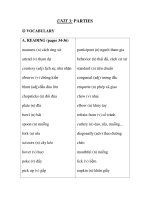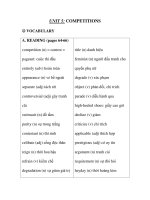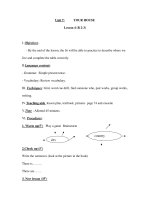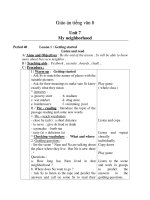Giáo án Tiếng Anh lớp 11: UNIT 7: WORLD POPULATION-READING ppt
Bạn đang xem bản rút gọn của tài liệu. Xem và tải ngay bản đầy đủ của tài liệu tại đây (73.05 KB, 4 trang )
Period:39
I. Objectives: By the end of the lesson , Ss will be able to:
- develop such reading micro-skills as scanning for specific ideas and
guessing meaning in context
- use the information they have read to discuss the topic.
II. Method: Integrated, mainly communicative
III. Teaching aids: Textbook, board, hand-outs, cassette tape and player.
IV. Procedures:
Teacher’s activities Students’ activities
Warm
-
up
: (5 minutes)
- Asks students close the book
- Asks students to answers some questions:
1. Are all the people in the same family?
2. Is it good to have many children?
3 .What will happen if every family have
a lot of children?
-Lead in : today we are going to learn
about world population
- Listen to the teacher and answer the questions
- Listen to the teacher and open the book –
Unit7, part A: reading
Before you read
: (7 minutes)
- Asks students work in pairs and look at
two pictures on the book and discuss the
questions
1. Where can you find these scenes?
2. What does each of the pictures tell
you?
3. Do you think that the larger in
population a country is, the stronger it
is? Why/Why not?
- Goes around and help if necessary
-Ask students to give the answers
- Listens to students and correct
pronunciation and grammar if necessary
While you read : (23 minutes)
- Ask students to look through the
passage and read in silence
1. - The scene in the first picture can be seen in
a family with too many children. As can be seen
in this picture, this couple has 6 children, and
they live in an old mud—and—draw cottage
with nothing valuable.
- The scene in the second picture can be seen
in a poor town. As can be seen in the picture,
the people in this town seem to have a hard flfe
and live in very old houses. The people tend to
do manual work and some are unemployed.
2. The first picture tells us that tf we have a big
family, we may not support our children
properly and give them a good flfe and
education. The second picture indicates that
population explosion can lead to poverty and
unemployment.
3. It is not always true that the larger in
population a country is, the stronger it is. The
reason is that a large population can result in
poverty, environmental pollution, unemployed
and social evils, which will easily weaken a
country.
Third World : EX : Laos , India , …
- Look at the book, listen to the teacher and work in
-
Help stud
ents read the passage
- Explain pronunciation and meaning of
new words which appear in the passage
-
Ask students to read loudly the difficult
words in chorus
Task 1 :
- Ask students to do task 1
- Let students work individual or in
groups
- Help students if necessary
Task 2:
-Asks students to read the passage again
then answer the questions
- Asks students to answer the following
questions
- Asks students look through the passages
then try to answer the questions in right
way
- Lets them work in pairs
pairs:
- discuss and give correct answers
- Listen to the teacher
- Ask some new words if necessary
- Keep the book open
- Listen to the teacher then do task 1
- Ask the teacher if necessary
- work individual or in group
- Write down in the notebook
Keys:
1.Although 2. method
3.increases 4. resources
5.sfigures 6. limit
7.international 8. control
Listen to the teacher and read the reading
passage.
- Try to answer the questions
Keys :
1.the population of the world in 10,000BC was
10 million. In1750 it was 6225 million; in 1850
it was 1300million ,in1950 it was 2510
million (paragraph 1)
2,by the year 2015 the population of the world
is expected to be over 7 billion (last
-
Helps
students if necessary
(the answers in the passage)
After you read : (8 minutes)
- Asks students to work in groups to
discuss find out five world largest
countries i population. say where they are
and which is the richest and which is the
poorest country
-Goes around to help the groups when
necessary
-Calls some groups to answer the
question
- Listens to students and correct mistakes
Home work: (2 minutes)
- Asks students to do Reading exercise of
Unit 7 in workbook and prepare Part B :
Speaking at home
line,paragraph1)
3,some scientists say it can ,but others say it
can’t (line2-4,paragraph2)
4. no, they don’t
5,because they know of no safe way to have
fewer children( line4-5,paragraph3)
- Listen to the teacher
-Discuss and find out five world largest
countries in population
- The students who are called to stand up to talk
loudly are intelligent ones
- Listen to the teacher and write down homework









